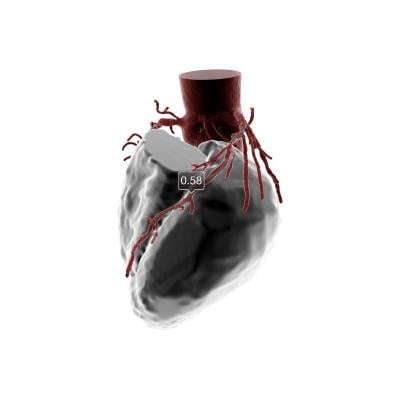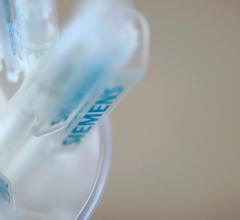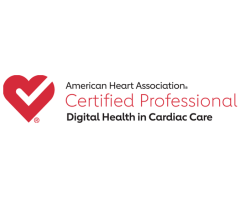
October 18, 2015 — New results from a multicenter, prospective study show that assessing fractional flow reserve estimated with computed tomography (FFR-CT) may reduce costs in selected symptomatic patients with suspected coronary artery disease (CAD).
Cost and quality of life outcomes from the PLATFORM trial were reported at the 27th annual Transcatheter Cardiovascular Therapeutics (TCT) scientific symposium, sponsored by the Cardiovascular Research Foundation (CRF). The study was also published in the Journal of the American College of Cardiology.
Fractional flow reserve (FFR) measures blood pressure and flow through a specific part of the coronary artery. It has typically been assessed using invasive catheter-based tests but can now be measured non-invasively using FFR-CT. The clinical effectiveness of using FFR-CT to guide management, compared with conventional testing, was recently demonstrated in the PLATFORM (Prospective Longitudinal Trial of FFR-CT: Outcomes and Resource Impacts) study. FFR-CT was also recently approved for clinical use by the U.S. Food and Drug Administration and received a CE mark in Europe.
The purpose of this study was to assess the economic and quality of life outcomes of evaluation strategies that use FFR-CT, based on data collected prospectively from the non-randomized PLATFORM study. Five hundred eighty-four symptomatic patients with suspected CAD were enrolled at 11 European centers (204 in the planned non-invasive testing stratum and 380 in the planned invasive testing stratum). Within the planned non-invasive testing stratum, 100 patients were evaluated with the usual care strategy, and 104 patients were evaluated with the FFR-CT strategy. In the planned invasive testing stratum, 187 patients were evaluated with the usual care strategy, and 193 patients were evaluated with the FFR-CT strategy.
The number of diagnostic tests, invasive procedures, hospitalizations and medications after 90 days were multiplied by U.S. cost weights and summed to derive total medical costs. Changes in quality of life (QOL) from baseline to 90 days were assessed using the Seattle Angina Questionnaire (SAQ), the EuroQOL (EQ-5D) and a visual analog scale (VAS).
In the 584 patients, 74 percent had atypical angina, and the pre-test probability of coronary disease was 49 percent. In the planned invasive stratum, mean costs were 32 percent lower among the FFR-CT patients than among the usual care patients who typically underwent invasive coronary angiography ($7,343 vs. $10,734, p<0.0001). In the non-invasive stratum, mean costs were not significantly different between the FFR-CT patients and the usual care patients who underwent traditional non-invasive risk stratification ($2,679 vs. $2,137, p=0.26).
In a sensitivity analysis, when the cost weight of FFR-CT was set to seven times that of CTA, the FFR-CT group still had lower costs than in the usual care group in the invasive testing stratum ($8,619 vs. $10,734, p < 0.0001) while in the noninvasive testing stratum, when the cost weight of FFR-CT was set to half that of CTA, the FFR-CT group had higher costs than the usual care group ($2,766 vs. $2,137, p=0.02).
Each quality of life (QOL) score improved in the overall study population (p<0.0001). In the noninvasive stratum, QOL scores improved more in FFR-CT patients than in usual care patients: SAQ 19.5 vs. 11.4, p=0.003; EQ-5D 0.08 vs. 0.03, p=0.002; and VAS 4.1 vs 2.3, p=0.82. In the invasive cohort, the improvements in QOL were similar in the FFR-CT and usual care patients.
“These results suggest that use of FFR-CT might reduce overall costs and improve patient quality of life,” said lead researcher Mark Andrew Hlatky, M.D. Hlatky is professor of health research and policy and of medicine at the Stanford University School of Medicine in California. “Larger, randomized studies are warranted to compare the clinical effectiveness of management strategies based on use of FFR-CT with management strategies based on using other methods of anatomic or functional evaluation.”
The study was funded by HeartFlow Inc. Hlatky reported research grants from HeartFlow.
Watch the VIDEO “Early U.S. Experience With FFR-CT in Evaluating ED Chest Pain Presentation.” A discussion with Simon Dixon, M.D., MBChB, on the use of fractional flow reserve-computed tomography (FFR-CT) to evaluate chest pain patients in the emergency department. He is chairman of the Department of Cardiovascular Medicine at Beaumont Health System and a professor of Medicine at the Oakland University William Beaumont School of Medicine. He discussed the first year of experience with FFR-CT at Beaumont Hospital in Royal Oak, Mich., during the Transcatheter Cardiovascular Therapeutics (TCT) 2016 annual meeting.
For more information: www.tctconference.com


 November 14, 2025
November 14, 2025 









